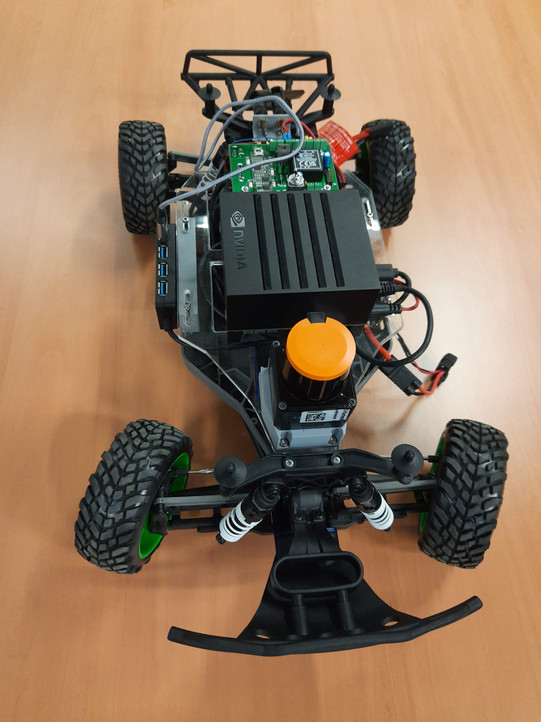F1/10 Car
The F1/10-Car is an experimental system developed as a scale model of a racing car to support research and teaching in the field of automated driving. The vehicle is based on a 1:10 scale RC car, which makes it both cost-efficient and easy to handle. It is equipped with a variety of sensors and actuators that make it possible to develop and test advanced algorithms for autonomous driving. It is cheaper and safer than using real vehicles, but still provides realistic conditions to simulate the challenges of autonomous driving.
Structure and components
The F1/10-Car has a stereo camera, LIDAR sensor, inertial sensors (IMU) which are used to record the environment and the vehicle's movement. As a powerful on-board computer, an NVIDIA Xavier processes the sensor data and carries out the trajectory planning and control.
Use in research
In research, the F1/10-Car serves as a platform for investigating various aspects of autonomous driving. This includes the development and optimization of algorithms for sensory perception, object recognition, trajectory planning and control. Thanks to its modularity, different sensors for environment perception and control approaches can be implemented and compared with each other. This enables flexible adaptation to specific research questions and makes the F1/10-Car an ideal platform for experimental studies in the field of autonomous driving.
Use in teaching
The F1/10-Car is used in teaching to teach students the basics and methods of autonomous driving in a practical way. Students can learn to understand the interactions between different components of the system in a controlled environment and develop and implement their own algorithms. By working on a real system, they gain valuable experience in dealing with sensors, actuators and real-time data processing. It also encourages an interdisciplinary approach as it combines knowledge from the fields of computer science, mechanical engineering, electrical engineering and robotics.

![[Translate to English:] [Translate to English:]](/storages/rst-etit/_processed_/e/8/csm_Technologie_RST_2018_339_a0a62aaa2f.jpg)
